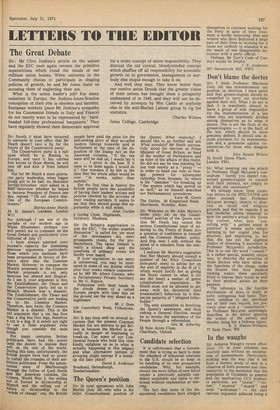The Great Debate
Sir : Mr Clive Jenkins's article on the unions and the EEC once again reveals the primitive superstitions which cloud the minds of our militant union bosses. When unionists in the Community choose to participate in shaping policies of growth, he and Mr Jones insist on accusing them of neglecting their job.
What is the union leader's job? For many unionists in Europe, the Jenkins-Jones-Scanlon conception of their role is obsolete and harmful. European workers (pace Mr Jenkins's sympathy for his Communist friends in Italy and France) do not merely want to be represented by 'hardheaded full-time professional bargainers.' They have regularly showed their democratic approval for a wider concept of union responsibility. They distrust the old cynical, bloodyminded concept which shuffles off all responsibility for economic growth on to government, management or anybody else stupid enough to take it on.
And well they may. They know better than our costive union Druids that the greater vision of their unions has brought them a prosperity undreamed of in 1945, and they will not be deceived by attempts by Mrs Castle or anybody else in the anti-Market Labour group to rig the statistics.
Charles Wilson Jesus College, Cambridge
Sir: Surely it must have occurred to someone in your office that Mr Heath doesn't care a fig for the future of the Conservative party.
The Conservative party is a raft upon which he is floating to Europe, and once it has carried him across to those shores, he will step off and kick it from behind him.
Not for Mr Heath a mere provincial party leadership, when bigger plums are to be had. As Monsieur Servan-Schreiber, once asked in a BB(111 interview whether he hoped to become President of France one day, replied: "Oh no! Above that. One of the European Commissioners."
Shirley-Anne Hardy 34 St James's Gardens, London W 11 Sir: Although I am one of the pariahs of our modern age (a White Rhodesian), perhaps you will permit me to comment on the Great Debate and particularly your Editorial of July 17.
I have always admired your journal's capacity for dismissing specious arguments particularly those which you maintain have been propounded in favour of Britain's entry into the Common Market. However, to compare the Munich proposals to the Common Market proposals is not only specious but absurd and illogical. As I see it, your argument is this; the Establishment, the Times and the Conservative party led us to Munich. Munich was a disaster. The Establishment, the Tunes and the Conservative party are leading us to the Common Market. Therefore, ipso facto, the Common Market is a disaster. This is the old argument that a cat has four legs, a dog has four legs, therefore a cat is a dog. It is surely not right to use a false argument even though you consider the ends noble.
For many centuries British Politicians have had the power (and the desire) to impose their will on the rest of the world. During this time, unfortunately, the British people have had no power to curtail the crusades of their ambitious politicians. From the adventurous wars of Marlborough through the follies of Lord North and the American colonies, the Crimea, World War I, the selling out of Europe to dictatorship at Munich and the selling out of Africa to dictatorship in the winds of change' era, the British
people have paid the price for the self-seeking glory of their so-called leaders. George Grenville said in Parliament at the time of the imposition of the Stamp Act on the American colonies, If the tax were still be laid on, I would lay it on . . . I glory in the hiss. If it were to be done again, I would do it." One wonders if he felt at the time that the whole affair would be over " in weeks, rather than months."
Eor the first time in history the British people have the possibility of having their leaders' actions and policies checked by the scrutiny of their trading partners. It seems to me that they should grasp this opportunity while it still exists.
Alan Curtiss 4 Goring Close, Highlands, • Salisbury, Rhodesia.
Sir On Britain's supplication to join the EEC, "the widest possible discussion" is called for, yet most of the newspapers are mere propaganda sheets for the proMarketeers. The Gii.eat Debate is really tt closed shop and the questions of ordinary voters are hardly ever heard.
If your opposition to our entry is unreserved, you may be interested in some of my doubts, which after four weeks remain unanswered by MP Mr Albert Costain, who is Parliamentary Private Secretary to Mr G. Rippon.
Politicians with their heads in the clouds dream of a united Europe; people with their feet on the ground see the way ahead as a nightmare
M. J. Goss 150 Canterbury Road, Folkestone, Kent.
Sin It has been said on several occasions that the present Common Market Six are anxious to get Britain in because the Market is actually in danger of beginning to break-up. Can some of our Continental friends who hold this view kindly enlighten us as to what is actually happening in this respect and what alternative pattern of grouping might emerge if a breakup did take place?
David S. Anderson Braehead, Helensburgh, Dunbartonshire.










































 Previous page
Previous page